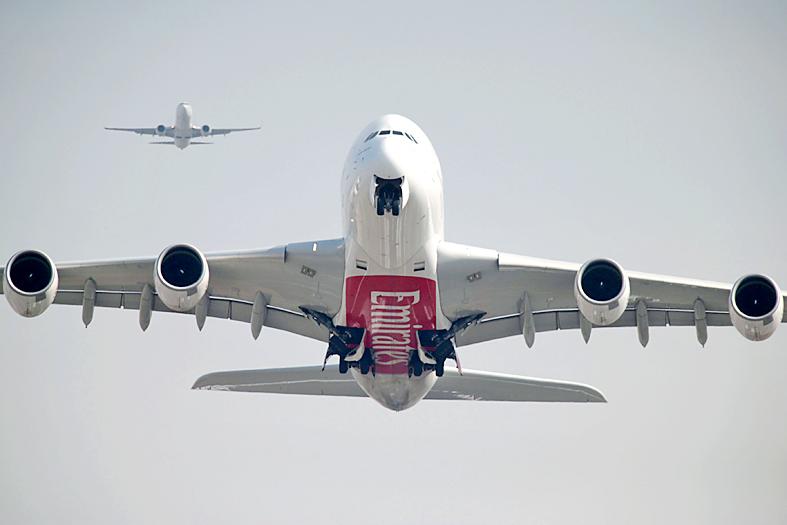Emirates Group is considering slashing about 30,000 jobs, the deepest cuts yet in a global airline industry that has been forced into near-hibernation by the COVID-19 pandemic.
The world’s biggest long-haul carrier could shrink a payroll that stood at 105,000 in March by as much as 30 percent as it reduces costs and realigns its operation to cope with a travel downturn expected to last for years, according to people familiar with the matter.
The state-owned group raised US$1.2 billion in new financing in the first quarter and is seeking aid from Dubai.

Photo: Reuters
Emirates is also considering accelerating the retirement of its fleet of A380s, the massive double-decker jets that can seat more than 500 passengers, some of the people said, asking not to be identified because the information has not been made public.
Emirates, the biggest operator of the Airbus SE super-jumbo aircraft, said it is reviewing “costs and resourcing” levels against projections as it prepares to resume service after an almost two-month grounding.
“No announcement has been made regarding mass redundancies at the airline,” it said in an e-mailed statement.
“Conserving cash, safeguarding our business and preserving as much of our skilled workforce as possible remain our top priorities,” it said.
Airlines across the globe are cutting jobs after being hit with an unprecedented near-total shutdown of travel.
With about 70 percent of global capacity idled, the airline industry stands to lose US$314 billion in ticket sales this year, according to the International Air Transport Association.
Emirates halted most of its passenger flights on March 25, but with some countries starting to ease travel restrictions, the airline plans to resume limited operations on Thursday.
Emirates president Tim Clark this month told Abu Dhabi-based the National that he expects demand for airline travel to be “tempered” for at least the next couple of years.
He also called the pandemic a black swan event for the industry, referring to a rare occurrence with extreme impact.
The early retirement of some A380s — the linchpin of a strategy that made Dubai the leading hub for flights around the globe — could potentially speed the end-game for the biggest-ever commercial jetliner. Airbus was forced to end the program last year after failing to agree with Emirates on terms, although it still has eight more to deliver.
Emirates, the biggest customer for the A380, dropped it from its long-term plans, ordered smaller wide-body aircraft and reviewed its route network, while increasing cooperation with regional discount carrier Flydubai — also state-owned.
Emirates plans to mostly rely on its Boeing Co 777 wide-body jets during the recuperation period, one of the people said.
The airline has 155 of the smaller US planes in its fleet, compared with 115 of A380s.
Emirates was just emerging from another downturn, completing a strategy rethink late last year after persistent low oil prices weighed on regional economic growth.
Now a recovery in oil prices has been reversed by the outbreak, with a glut in the oil market exacerbating the economic hit on the Gulf.
Profit for March was more than 1.5 billion dirhams (US$408 million) lower than expected and the group lost more than 3.4 billion dirhams in revenue that month, it said in its annual report published last week.

To many, Tatu City on the outskirts of Nairobi looks like a success. The first city entirely built by a private company to be operational in east Africa, with about 25,000 people living and working there, it accounts for about two-thirds of all foreign investment in Kenya. Its low-tax status has attracted more than 100 businesses including Heineken, coffee brand Dormans, and the biggest call-center and cold-chain transport firms in the region. However, to some local politicians, Tatu City has looked more like a target for extortion. A parade of governors have demanded land worth millions of dollars in exchange

An Indonesian animated movie is smashing regional box office records and could be set for wider success as it prepares to open beyond the Southeast Asian archipelago’s silver screens. Jumbo — a film based on the adventures of main character, Don, a large orphaned Indonesian boy facing bullying at school — last month became the highest-grossing Southeast Asian animated film, raking in more than US$8 million. Released at the end of March to coincide with the Eid holidays after the Islamic fasting month of Ramadan, the movie has hit 8 million ticket sales, the third-highest in Indonesian cinema history, Film

Taiwan Semiconductor Manufacturing Co’s (TSMC, 台積電) revenue jumped 48 percent last month, underscoring how electronics firms scrambled to acquire essential components before global tariffs took effect. The main chipmaker for Apple Inc and Nvidia Corp reported monthly sales of NT$349.6 billion (US$11.6 billion). That compares with the average analysts’ estimate for a 38 percent rise in second-quarter revenue. US President Donald Trump’s trade war is prompting economists to retool GDP forecasts worldwide, casting doubt over the outlook for everything from iPhone demand to computing and datacenter construction. However, TSMC — a barometer for global tech spending given its central role in the

Alchip Technologies Ltd (世芯), an application-specific integrated circuit (ASIC) designer specializing in server chips, expects revenue to decline this year due to sagging demand for 5-nanometer artificial intelligence (AI) chips from a North America-based major customer, a company executive said yesterday. That would be the first contraction in revenue for Alchip as it has been enjoying strong revenue growth over the past few years, benefiting from cloud-service providers’ moves to reduce dependence on Nvidia Corp’s expensive AI chips by building their own AI accelerator by outsourcing chip design. The 5-nanometer chip was supposed to be a new growth engine as the lifecycle